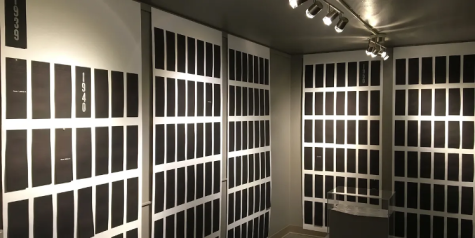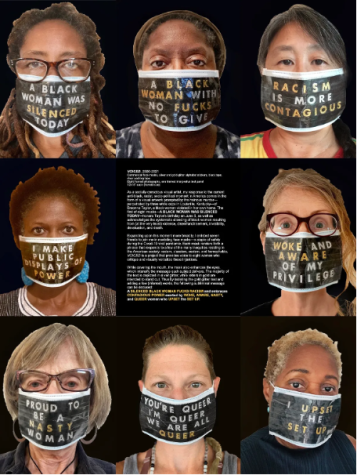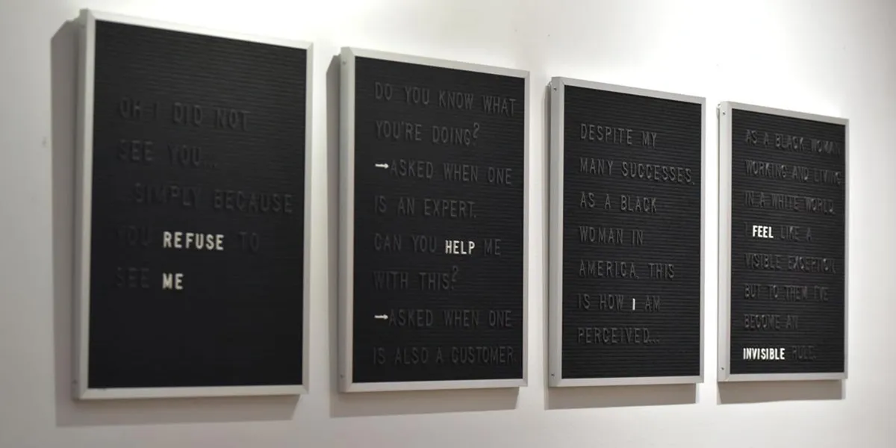On Thursday, March 29, Veronica Jackson came to the University of Massachusetts to give a presentation titled “A Constellation of Blackness,” taking the audience through an exploration of her visual art projects and artistic processes.
“My work is autobiographical, stems from my position as a Black woman marking space, and responds to the travails of my ancestors,” Jackson said on her website.
Jackson, who has a background in both visual art and architecture, often explores both feelings of invisibility and hypervisibility that are specific to the Black experience. Her work also centers heavily around words and text. She often plays on the meaning or arrangement of words to communicate a larger message about the Black experience.
Jackson stated in a PBS special that her art “Visually addresses the plight I have as a Black woman in America.”
One of Jackson’s 2019 projects, “That’s Pops’s Money,” is a series of timecards hand-crafted one-by-one by herself. The cards list and calculate all the laborious hours her grandmother put into taking care of the house, kids and other domestic responsibilities that went unnoticed.
Her grandmother was living off her late husband’s pension when someone said to Jackson “That’s Pops’s money.” This moment inspired the entire project.
“That was the seed of my feminism,” Jackson said.

The dark blue letters on the black background are supposed to represent her grandmother’s “invisible labor,” Jackson noted.
The name on the timecard, “Betta Jefferson,” is an alias for her grandmother. The name she uses for her grandfather in this project is “Thomas Jefferson,” which is intended to remind viewers of the historical Jefferson, who enslaved over 600 people. Jackson is constantly considering alternative referencing when creating art.
“I have this sense of layering information,” Jackson said. “So, all my work has multiple layers.”
Jackson’s grandfather, as she recalled, valued his sons over his daughters. So, Jackson displayed the birthdates of her grandmother’s four daughters all in dark ink, and the five sons’ birthdates in bright white ink to emphasize the invisibility that comes with being a Black woman.
Jackson installed this expansive art installation in an old vault to speak about devaluation “in a place of value.”
A project from 2017 called “Language of Invisibility on Display” has a similar effect. Again, Jackson displays dark letters upon a black background, but highlights certain words in white.
When the boards are placed in order, it reveals a subliminal message: Refuse me help I feel invisible.
A similar project reads “F*** no, to my silencing,” in white letters on Black paper, born out of phrases used to enforce stereotypes on to Black women. Her art works to dispel stereotyping of Black women.
Jackson’s art is also concerned with how Black women’s voices have been devalued and silenced, and the ways women have triumphed over that oppression.

Her project “Voiced” from 2020 is a response to the current “anti-Black, racist, socio-political movement in America,” Jackson writes. This piece was prompted by the murder of Breonna Taylor, a Black woman killed in her own home.
Since this project was completed in the middle of the COVID-19 pandemic, Jackson wanted to play on the image of masks. She photographed herself and seven friends, each of them bearing a different message on their mask: “I upset the set up” and “A Black women with no f***s to give,” for example.
“This project provides voice to eight women who critique and visually verbalize their individual response to the systemic injustices enacted upon women in America,” Jackson wrote.
Simone Cambridge, an art history masters student and attendee of Jackson’s talk said she found the artwork very inspiring. “We don’t see a lot of Black woman artists give presentations at campus.”
These are only a few examples taken from Jackson’s extensive body of work. The artist is constantly interpreting the world around her and transforming it into artwork. “What you put in your visual mind matters, so I’m always looking,” Jackson said.
Jackson wants to educate with her artwork, but she also wants her work to communicate agency for Black women: “The agency to be, the agency to be unapologetically Black,” she said.
Veronica Jackson can be followed on Instagram @veronicadcjackson.
Grace Lee can be reached at [email protected].




















